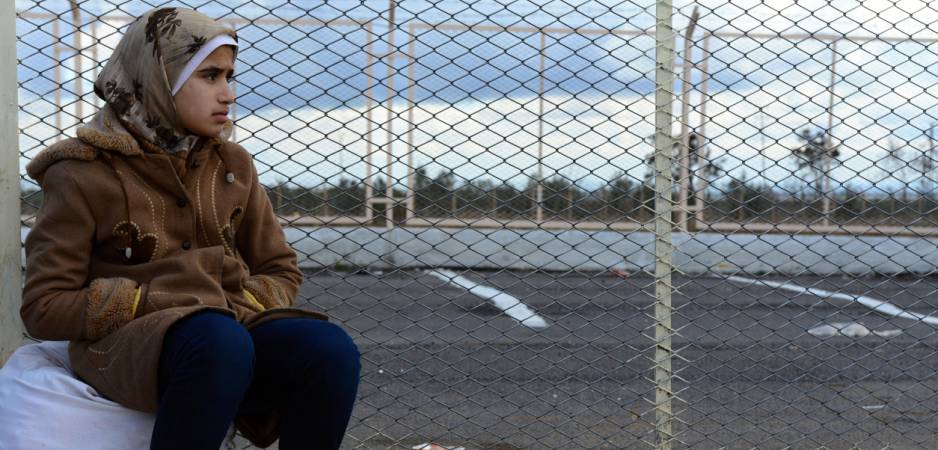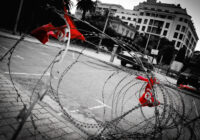As Aleppo falls, the world has forgotten about civilians in Syria.
I woke up this morning to a video of an old Syrian man gesturing wildly at a camera as bombs tore up the concrete behind him. He looked like many Arab grandfathers I know, bearded and wearing a plaid shirt decorated with dust.
On Twitter: images of soldiers carrying civilians out of a besieged city; women committing suicide rather than being raped by government forces; politicians barely holding an emergency meeting; a boy weeping over his dead mother.
We have failed you, Aleppo.
We have watched for years while you burned. While bewildered children covered in dust were found in the rubble; while refugees died on foreign shores in Mediterranean water; while our politicians kept silent or helpfully funded another proxy war.
We have failed you.
We have invented sanitized phrases for what is happening to your people. In a few years, if your “otherness” is allowed in our glossy history books, we will call them “war crimes” by “rebels” or “government forces” or “coalitions.” We will call those who fled but had nowhere to go “refugees,” and we will lock up our women because we fear their “gorilla-like barbarism.”
We will pretend blissful ignorance of our role in watching your skin torn apart and your people ground into the rubble. We will turn away, pretending we did not do the same thing in Kosovo, in Rwanda, in Myanmar as they quietly exterminate the stateless Rohingya.
We will pretend we knew nothing of Vietnam, of Iraq, of Afghanistan. We will pretend we didn’t know those monsters existed.
We have failed you.
But you possess something the others did not: your phones, your videos, your ability to speak a language we understand. You force us to bear witness to you in a moment—just a fragile, crippling, traumatic moment—of empathy.
Robert Fisk writes that, on the eve of the Taliban entering Kandahar, he was startled by a sound outside. He watched from his balcony as, across the city, families raised their voices, chanting “Allahu Akbar”—a cry now most often associated with black-clad menaces, but in every other moment, a cry of recognition.
In Islam, we say that one of the names of God is Shahid, the Witness. In our prayers, we bear witness to the oneness of God. In Kandahar, the people bore witness to their own helplessness, the untranslatable feeling of complete despair. In Aleppo, we are forced to bear witness as the veneer of civilization we have attempted to construct is stripped away.
You shame us, Aleppo.
Your faces, your photos, your cries are not a Hollywood production. No one is coming out alive even as the United Nations hurriedly attempts to broker a deal to evacuate 100,000 civilians. No one is listening, even as British politicians fail to fill a room for an emergency hearing and no one but John Kerry has said anything to Russia.
Even we don’t hold our own politicians accountable. Even we don’t care enough, no matter how many times we shed tears over your deaths.
We watch it unfold on our expensive tablets, expensive phones, in the comfort of our relatively secure homes waiting for the next Muslim bogeyman or imminent threat to our safety while you are exterminated like fish in a barrel. We list the names of our dead, award them memorials when we are feeling generous, but your children will have no gravestones but the rubble or the sea.
You shame us.
It is time we stopped pretending at civility, stopped pretending that because of your strange ways and strange language, because of your skin and your faith, you are the barbarians. It is you trapped in basements with the severed hands of children; you who struggle to provide hospitals, schools, shelter to your population while we cheerfully continue to ignore politics in favor of discussing Kanye West.
 It is you who do not have the privilege of our freedom and you who died for it. It is you who we should remember and name every day because we cannot leave our own world long enough to march against your murders in the street no matter how many times we read Night and the Diary of Anne Frank or whitewashed history textbooks. We keep saying “never again” but you have outed us because we don’t mean it.
It is you who do not have the privilege of our freedom and you who died for it. It is you who we should remember and name every day because we cannot leave our own world long enough to march against your murders in the street no matter how many times we read Night and the Diary of Anne Frank or whitewashed history textbooks. We keep saying “never again” but you have outed us because we don’t mean it.
We don’t mean it. Even while we watch our governments vie for hegemony; even while we watch them engage in the fifth or sixth proxy war in our generation; even while we know that part of this is our fault, our taxes, our silence, we say nothing because those books reports we wrote in eighth grade on injustice were only meant for the utopian civilization we supposedly live in.
You do not fit into our world—your unsanitized blood, your broken limbs, the faces of your dead children, we do not want them here in our comfortable bubble of “never again.”
You shame us.
We shame ourselves.
The views expressed in this article are the author’s own and do not necessarily reflect Fair Observer’s editorial policy.
Photo Credit: Radek Procyk
Support Fair Observer
We rely on your support for our independence, diversity and quality.
For more than 10 years, Fair Observer has been free, fair and independent. No billionaire owns us, no advertisers control us. We are a reader-supported nonprofit. Unlike many other publications, we keep our content free for readers regardless of where they live or whether they can afford to pay. We have no paywalls and no ads.
In the post-truth era of fake news, echo chambers and filter bubbles, we publish a plurality of perspectives from around the world. Anyone can publish with us, but everyone goes through a rigorous editorial process. So, you get fact-checked, well-reasoned content instead of noise.
We publish 2,500+ voices from 90+ countries. We also conduct education and training programs
on subjects ranging from digital media and journalism to writing and critical thinking. This
doesn’t come cheap. Servers, editors, trainers and web developers cost
money.
Please consider supporting us on a regular basis as a recurring donor or a
sustaining member.
Will you support FO’s journalism?
We rely on your support for our independence, diversity and quality.






